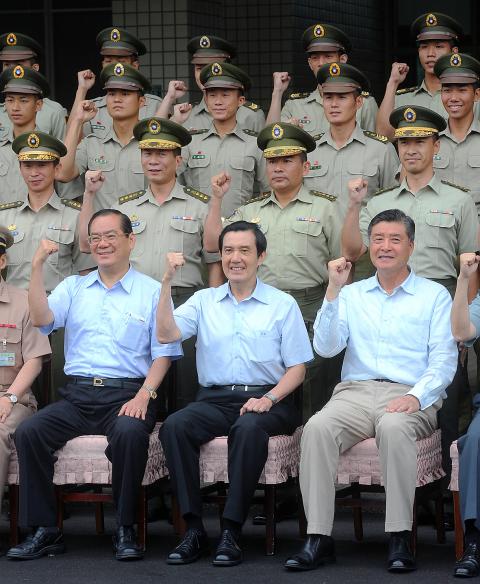President Ma Ying-jeou (馬英九) inspected military units yesterday and was briefed on developments over the Diaoyutai Islands (釣魚台) amid growing tension over the disputed archipelago, the Ministry of National Defense said.
The Taiwanese military has found that Japanese patrol ships and aircraft, as well as Chinese fishing boats, surveillance vessels and missile patrol vessels, are operating near the Diaoyutais, Ma said at a gathering with military police after his inspection visit to an air force radar squadron and a navy radar station.
“We have a full grasp of the situation,” Ma said, adding that the air force, the navy and the Coast Guard Administration are keeping a close eye on the waters around the Diaoyutais and other nearby islets in the region.

Photo: Liu Hsin-de, Taipei Times
Ma’s remarks came amid an escalating territorial dispute over the Diaoyutais after the Japanese government, which already administers the islands, recently decided to nationalize the island group by buying three of them from a private owner.
Meanwhile, the ministry said in a statement that it has beefed up air patrols over the Diaoyutais and waters surrounding the islands.
Reaffirming Taiwan’s sovereignty over the Diaoyutais, Ma reiterated the government’s policy of resolving the disputes on the principles of safeguarding sovereignty, shelving differences, pursuing peace and reciprocity and jointly exploring resources.
The president also repeated his call for all sides involved in the dispute — Taiwan, Japan and China — to adopt the East China Sea peace initiative he proposed early last month and to address the issue through peaceful means.
The Diaoyutais, known as the Senkakus in Japan, lie about 120 nautical miles (220km) northeast of Taiwan.

ANOTHER EMERGES: The CWA yesterday said this year’s fourth storm of the typhoon season had formed in the South China Sea, but was not expected to affect Taiwan Tropical Storm Gaemi has intensified slightly as it heads toward Taiwan, where it is expected to affect the country in the coming days, the Central Weather Administration (CWA) said yesterday. As of 8am yesterday, the 120km-radius storm was 800km southeast of Oluanpi (鵝鑾鼻), Taiwan’s southernmost tip, moving at 9kph northwest, the agency said. A sea warning for Gaemi could be issued tonight at the earliest, it said, adding that the storm is projected to be closest to Taiwan on Wednesday or Thursday. Gaemi’s potential effect on Taiwan remains unclear, as that would depend on its direction, radius and intensity, forecasters said. Former Weather Forecast

As COVID-19 cases in Japan have been increasing for 10 consecutive weeks, people should get vaccinated before visiting the nation, the Centers for Disease Control (CDC) said. The centers reported 773 hospitalizations and 124 deaths related to COVID-19 in Taiwan last week. CDC Epidemic Intelligence Center Director Guo Hung-wei (郭宏偉) on Tuesday said the number of weekly COVID-19 cases reported in Japan has been increasing since mid-May and surpassed 55,000 cases from July 8 to July 14. The average number of COVID-19 patients at Japan’s healthcare facilities that week was also 1.39 times that of the week before and KP.3 is the dominant

The Chinese Communist Party’s (CCP) working group for Taiwan-related policies is likely to be upgraded to a committee-level body, a report commissioned by the Mainland Affairs Council (MAC) said. As Chinese President Xi Jinping (習近平) is increasingly likely to upgrade the CCP’s Central Leading Group for Taiwan Affairs, Taiwanese authorities should prepare by researching Xi and the CCP, the report said. At the third plenary session of the 20th Central Committee of the CCP, which ended on Thursday last week, the party set a target of 2029 for the completion of some tasks, meaning that Xi is likely preparing to

US-CHINA TRADE DISPUTE: Despite Beijing’s offer of preferential treatment, the lure of China has dimmed as Taiwanese and international investors move out Japan and the US have become the favored destinations for Taiwanese graduates as China’s attraction has waned over the years, the Ministry of Labor said. According to the ministry’s latest income and employment advisory published this month, 3,215 Taiwanese university graduates from the class of 2020 went to Japan, surpassing for the first time the 2,881 graduates who went to China. A total of 2,300 graduates from the class of 2021 went to the US, compared with the 2,262 who went to China, the document showed. The trend continued for the class of 2023, of whom 1,460 went to Japan, 1,334 went to